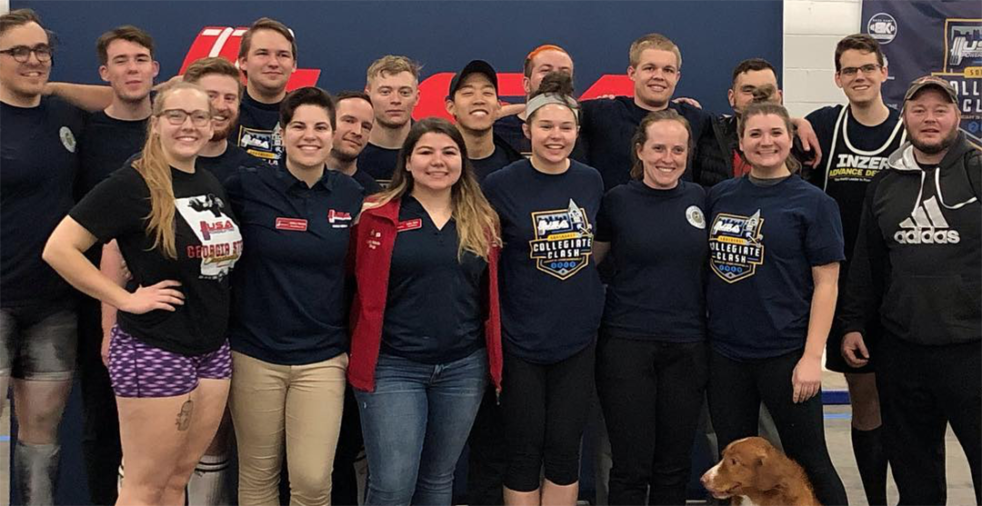The Georgia Tech Barbell Club states on OrgSync that it is “a supportive community of dedicated fitness enthusiasts focused on supporting athletes of all skill levels and barbell related disciplines,” and president Matthew Lattime agrees wholeheartedly. After a few minutes of talking with him, it is clear that the club is meant to be all-inclusive to the Tech community, even aiming to reach those with little fitness experience. The key to their success? “Having a community behind you that supports you,” he says.
Lattime is a BME student at Tech that took up powerlifting in high school, but did not necessarily come to Tech with the conscious intention of continuing his sport. As an out-of-state student at FASET, he experienced the organization fair that can be a whirlwind for incoming students. After realizing the Campus Recreation Center might not fit his fitness needs and desires, he stumbled upon the Barbell Club through JacketPages and reached out to the president of the club at the time to express his interest in joining the organization.
Although Lattime had prior experience with the sport, many new members come in at a novice level with the intention of increasing their strength. He explained that this allows for bonding among the new members, as everyone learns the ins and outs together, furthering the sense of community that the club treasures. On the other hand, some students come in just as Lattime did, with experience under their belts, ready to the hit the ground running — or lifting. The organization has implemented a mentorship program that provides any new member with a partner in crime to learn the ropes or share ideas with. “The club fluctuates in terms of membership,” Lattime says. “There are lots of members in the fall, but it peters off in the spring.”
For students who stick around, the organization offers various competition opportunities throughout the year and across the nation. The most common types of meets are USA Powerlifting-sanctioned meets, with some particularly talented athletes making their way to USA Powerlifting Collegiate Nationals at the end of the school year. Additionally, Tech hosts its own “mock” meet, which provides the athletes with an opportunity to rehearse and showcase their abilities in a low pressure environment. The meet is not sanctioned and does not officially count for anything, but it allows the athlete to get a realistic feel for what competition day will be like.
Lattime lit up when asked about his proudest moment as a member of the organization. He excitedly spoke about the sanctioned meet that the Barbell Club was able to put together earlier this school year. The executive members began planning for the meet in early to mid-summer of last year in order to secure the needs for a sanctioned meet — proper equipment, registration and administrative fees, referees and referee certification and drug testing. Lattime explained that while only about ten percent of the athletes are subject to drug testing, it is an important element of the sanctioned meet. The Jackets competed at this meet, named the Southeast Collegiate Clash, against athletes from Auburn, the University of Georgia and Georgia Southern University. The meet was a milestone moment for the Tech program, which showed itself capable of playing host for a real meet.
The organization strives to hone the discipline of each of the athletes while providing a community that shares and supports the athletes’ goals. Coaches such as James Townsend, a USA Powerlifting Coach of the Year, come to give pointers on technique and programming a few times a week. The Barbell Club also offers advice on everything from weightlifting to nutrition throughout the year. “We want members to be the best [people] they can be and have coaching hours, seminars and physical therapists to injuries,” Lattime says of the organization’s recent efforts.
Although the Barbell Club was started with the intention of creating a powerlifting-focused program, Lattime expects the group to encompass more general members and invites those with more “niche” interests to bring their skills and thoughts to the table. He also hopes to see the group begin to give back to the community on a larger scale by fully committing to a charity or service group. “We want to engage general members more,” he notes when discussing the importance of fostering these various interests.
These aims contribute to the idea that the club is meant to promote more than physical strength; it will help create and add to well-rounded and thoughtful members. The group lists its yearly goals online. They include “[growing] our community by emphasizing fitness and nutrition on campus”, “[hosting] a philanthropy event to raise money for a local charity” and “[financing] athletes to numerous local, national, and international competitions.” At its current rate of growth, it ought to surprise no one if Barbell Club meets all of those objectives by the end of this year.
